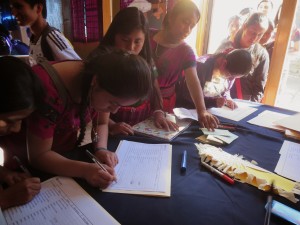Inspired. That is the best description I can give after returning from five weeks in Chajul with the Philanthropiece Scholars. I am not a talented enough writer to put into words the emotion and excitement I felt about this program. In a nutshell, it is working – better and faster than we could have imagined. Our goal is to invest in change-makers who will acquire the knowledge and experience they need to be able tackle their community’s most difficult challenges. The Scholars haven’t necessarily solved all of Chajul’s problems yet, but when you interact with them, you certainly feel that the seeds of these changemakers have been sown in fertile ground and are already bearing fruit.
When I take a step back from the official goals and objectives and monitoring and evaluation of this program, I ask myself what we’re trying to accomplish at the most basic level. We won’t eradicate hunger or poverty overnight – thinking that “we” are actually the proper actors to address these issues may be presumptive and even arrogant. That is why I am so satisfied by our current strategy. We are not in Chajul to “save” anyone. By simply sharing basic tools, resources, and knowledge, we are empowering these young women and men to become active agents of change in their own way. We believe in them, and they believe in themselves.
 Spending an extended time in Chajul both enlightened and humbled me. Firstly, I collided directly with the fact that I am a foreigner, co-directing and designing a program in an environment that is very different than my own. I repeatedly encountered situations where my planning, analysis, and opinions were simply wrong. I work in our office in Colorado. This program runs in Chajul. Things do not work in the same way or on the same schedule. My well-planned and intentionally designed “square pegs” frequently failed to fit into the “circular holes” for which they were meant. Implementing the curriculum I have been designing for months was the best example of this. My sense of time and pace of the program was misguided. My work was and will be valuable, but it had to undergo a tempering process to fit the Chajul mold. In the end, the solution came from the Scholars themselves, and acted as a reminder to maintain an awareness of the cross-cultural setting in which we work. Patience, flexibility, and adaptability are crucial.
Spending an extended time in Chajul both enlightened and humbled me. Firstly, I collided directly with the fact that I am a foreigner, co-directing and designing a program in an environment that is very different than my own. I repeatedly encountered situations where my planning, analysis, and opinions were simply wrong. I work in our office in Colorado. This program runs in Chajul. Things do not work in the same way or on the same schedule. My well-planned and intentionally designed “square pegs” frequently failed to fit into the “circular holes” for which they were meant. Implementing the curriculum I have been designing for months was the best example of this. My sense of time and pace of the program was misguided. My work was and will be valuable, but it had to undergo a tempering process to fit the Chajul mold. In the end, the solution came from the Scholars themselves, and acted as a reminder to maintain an awareness of the cross-cultural setting in which we work. Patience, flexibility, and adaptability are crucial.
Secondly, I learned to surrender and to trust in our processes, and more importantly in the Scholars themselves. As I mentioned, the Scholars are truly progressing at an inspiring pace. Over and over I felt that I was no longer teaching students or “amateurs,” but instead collaborating with peers. I felt proud and encouraged that the Scholars were putting into practice the lessons we have been teaching for the last few years. The case in point happened during the final interviews for the new Program Coordinator. A group of four Scholars conducted Skype interviews with the two final candidates and later presented their findings to Ernesto and me. Without exaggeration, I can state that they conducted a more thorough and critical interview than I did. Their analysis and reasoning were sound, and they exhibited a confidence and stability one would expect from a professional.
The strength of the Scholars Program is manifested through these experiences. Throughout the year, we will continue to monitor and evaluate our performance towards specific goals and objectives. On a personal level however, when I look into the eyes of a young woman, who only two years ago showed up in the office as a timid, self-conscious high school graduate, but who now leads her colleagues through complex administrative processes, navigates difficult consensus-building, and contemplates strategic plans for the future, I am truly inspired.
 Jake Matlak is Philanthropiece’s Associate Director of Programs. Aside from feeling inspired, and inspiring changemakers worldwide, you’ll find him lighting up the field in Boulder’s recreational soccer leagues.
Jake Matlak is Philanthropiece’s Associate Director of Programs. Aside from feeling inspired, and inspiring changemakers worldwide, you’ll find him lighting up the field in Boulder’s recreational soccer leagues.


